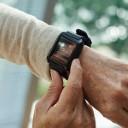-
The Future of Cancer Care
Forum discusses next-generation technologies that will guide oncology research and patient care in the years to come.
by Thomas Celona
-
Tests Spot Signs of Cancer in the Blood
At the AACR Virtual Annual Meeting I, researchers presented data on blood tests that aim to supplement current cancer screening and speed up diagnosis.
by Kate Yandell
-
Do Patients Want Online Access to Test Results?
A survey finds many patients prefer talking through imaging findings related to cancer with their physician rather than viewing reports online—but only if the wait for results is short.
by Cindy Kuzma
-
Proton Therapy Is Associated With Reduced Side Effects
When combined with chemotherapy, the newer form of radiation comes with fewer severe side effects than standard radiation therapy, a study suggests.
by Sue Rochman
-
Crowdfunding for Cancer
Researchers found that millions of dollars are donated on fundraising sites to support ineffective and even harmful treatments.
by Jon Kelvey
-
Measuring Your Movement
Researchers are exploring whether wearable personal activity monitors could provide doctors with a more complete picture of cancer patients' well-being.
by Brad Jones
Cancer Talk
Physical Activity Linked to Lower Colon Cancer Recurrence
Participating in a structured exercise program after treatment was associated with a reduced risk of recurrence in people who had colon cancer.
by Sandra Gordon
Gaps in Survivorship Care Leave Unmet Needs After Cancer TreatmentA survey of head and neck cancer survivors reveals that many are not getting adequate survivorship care and may not even know it is available.
by Cameron Walker
Improving Communication for Deaf Cancer PatientsAfter a cancer diagnosis, people who are deaf or have hearing problems can struggle if accommodations don’t meet their communication needs.
by Eric Fitzsimmons
Is Immunotherapy Right for People Hospitalized With Advanced Cancer?Researchers find no evidence that immune checkpoint inhibitors benefit cancer patients getting inpatient care. They urge earlier consideration of palliative care.
by Kyle Bagenstose










